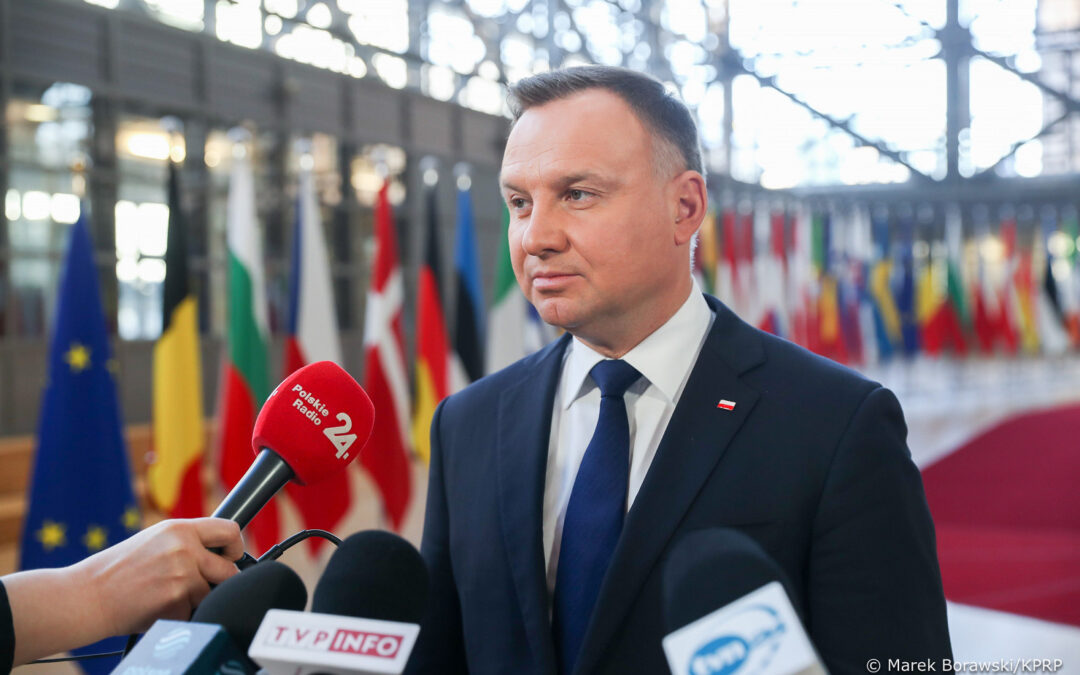President Andrzej Duda has accused the development minister, Waldemar Buda, of giving “untrue” information about Poland’s efforts to unblock billions of euros in frozen European funds.
The episode is the latest sign of tensions within the ruling camp over whether and how Poland should roll back its judicial reforms in order to satisfy the European Union’s rule-of-law demands.
Speaking yesterday to Polskie Radio, Buda was reminded by his interviewer, Beata Michniewicz, that he had promised in mid-2022 that Poland would begin receiving its unblocked funds by the end of last year. Yet that still has not happened.
The minister blamed the EU for “playing [games] over this issue”. But he added that a new judicial reform bill, submitted by the ruling party last month, should be “sufficient to unblock these funds” and “end this dispute”.
He acknowledged that Duda had expressed doubts over the legislation – which led to the bill being temporarily withdrawn for further consultation – but added that “the talks which are being held with the president after his statement have reassured him very much”.
The government has temporarily withdrawn a judicial bill submitted earlier this week after the president expressed doubts over it.
There will now be further consultation on the plans, which are intended to meet EU demands in order to unlock frozen funds https://t.co/KvXRgsIfgs
— Notes from Poland 🇵🇱 (@notesfrompoland) December 16, 2022
“I do not suspect that there are any problems at the president’s level with accepting the solutions negotiated with the European Commission,” Buda added.
His remarks, however, prompted Duda to issue a statement on Twitter in which he denied the minister’s claims.
“I do not know where Minister Buda obtains such information, but it is untrue and his remarks unfortunately are far from the truth,” wrote the president last night.
„Dzisiaj już wiem, że te rozmowy, które są prowadzone z prezydentem po tej wypowiedzi, bardzo mocno go uspokajają.”
Nie wiem od kogo Pan Min. Buda czerpie takie informacje ale są one nieprawdziwe i w swojej wypowiedzi niestety mija się z prawdą. https://t.co/UgB2oWgAHJ— Andrzej Duda (@AndrzejDuda) January 2, 2023
Speaking later to Polsat News, the government’s spokesman, Piotr Müller, admitted that “Waldemar Buda made a mistake because he is not participating in negotiations with the president’s chancellery”.
“I understand the good intentions of Minister Buda, but here he got ahead of himself and he has already apologised for it,” added Müller.
Buda himself then took to Twitter to admit that he had “poorly described” the situation. “If the talks are at a different stage than I indicated, I can only offer my deepest apologies,” he added.
Last month, Europe minister Szymon Szynkowski vel Sęk – who has led negotiations with the EU – also publicly apologised to Duda over the fact that the president “did not feel sufficiently informed and consulted” over the proposed legislation.
Prawdą jest, że nie uczestniczę w rozmowach z Panem Prezydentem ws. KPO i źle to opisałem. Bardzo kibicuje by sprawy się zakończyły pozytywnym efektem.
Jeżeli rozmowy są na innym etapie niż wskazałem, mogę tylko najmocniej przeprosić. https://t.co/n5husqmnGl— Waldemar Buda (@waldemar_buda) January 2, 2023
While Szynkowski vel Sęk, Buda and the prime minister, Mateusz Morawiecki, have spoken in support of the new bill, others in the ruling camp have been more critical of it.
Justice minister Zbigniew Ziobro, who leads eurosceptic junior coalition member United Poland (Solidarna Polska), has come out strongly against any compromise with Brussels, which he says would undermine Poland’s sovereignty.
Even the chairman of the main ruling national-conservative Law and Justice (PiS) party, Jarosław Kaczyński, has said the proposed legislation “could be extremely destructive for the judiciary and the entire state apparatus” – despite the fact that it was submitted by his own MPs.
Ruling party leader Jarosław Kaczyński has spoken out against the judicial bill proposed by his own MPs and supported by the party’s prime minister and spokesman.
“Adopting it could be extremely destructive for the judiciary and entire state apparatus” https://t.co/odmNPhxzde
— Notes from Poland 🇵🇱 (@notesfrompoland) December 17, 2022
Main image credit: Adam Borawski/KPRP

Daniel Tilles is editor-in-chief of Notes from Poland. He has written on Polish affairs for a wide range of publications, including Foreign Policy, POLITICO Europe, EUobserver and Dziennik Gazeta Prawna.




















